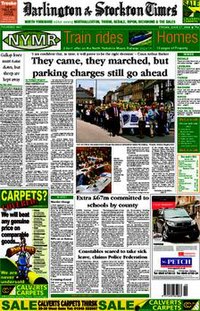 Darlington & Stockton Times front page | |
| Type | Regional weekly newspaper |
|---|---|
| Format | Compact [1] |
| Owner(s) | Gannett Company [2] |
| Founder(s) | George Brown [1] |
| Editor | Hannah Chapman [2] |
| Founded | 1847 in Barnard Castle [1] |
| Language | English |
| Headquarters | Priestgate, Darlington [2] |
| City | Darlington |
| Country | UK |
| Circulation | 7,690(as of 2024) [3] |
| Website | Official website |
The Darlington & Stockton Times is a British, regional, weekly, paid for, newspaper covering the Richmond - Darlington - Stokesley - Thirsk - Leyburn area. [4] It is published in Darlington by Newsquest Media Group Ltd, a subsidiary of Gannett Company Inc. [2] Three separate editions are published for County Durham, North Yorkshire and Cleveland. [5]
Contents
A substantial proportion of Darlington & Stockton Times readers live in rural areas, and it contains information and news relating to farming issues. [4]
It was one of the last UK newspapers to devote its front page entirely to adverts; a practice that persisted until 1997. Compact format replaced broadsheet in 2009. [1]